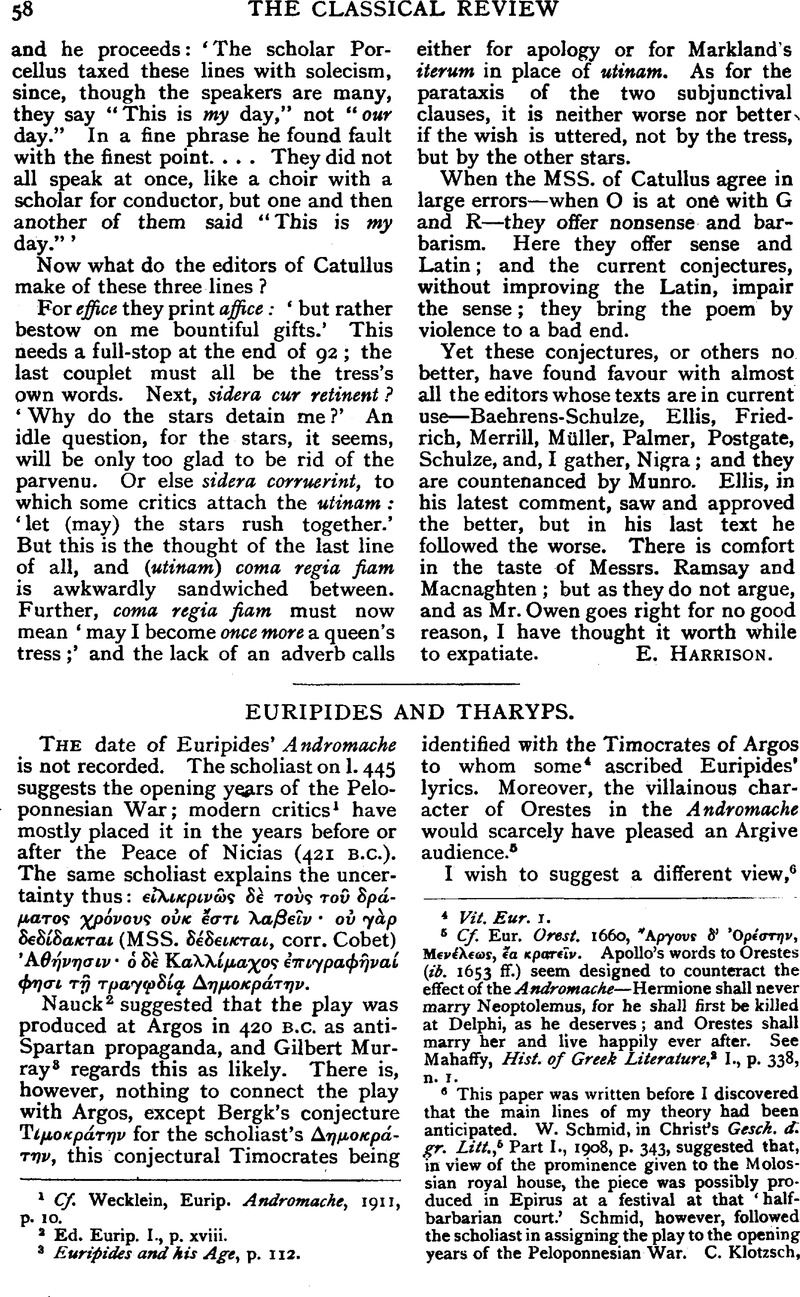Published online by Cambridge University Press: 27 October 2009

page 58 note 1 Cf. Wecklein, , Eurip. Andromache, 1911, p. 10.Google Scholar
page 58 note 2 Ed. Eurip. I., p. xviii.
page 58 note 3 Euripides and his Age, p. 112.
page 58 note 4 Vit. Eur. 1.
page 58 note 5 Cf. Eur. Orest. 1660, ![]()
![]() . Apollo's words to Orestes (id. 1653 ff.) seem designed to counteract the effect of the Andromache—Hermione shall never marry Neoptolemus, for he shall first be killed at Delphi, as he deserves; and Orestes shall marry her and live happily ever after. See Mahaffy, , Hist, of Greek Literature,2 I., p. 338, n. 1.Google Scholar
. Apollo's words to Orestes (id. 1653 ff.) seem designed to counteract the effect of the Andromache—Hermione shall never marry Neoptolemus, for he shall first be killed at Delphi, as he deserves; and Orestes shall marry her and live happily ever after. See Mahaffy, , Hist, of Greek Literature,2 I., p. 338, n. 1.Google Scholar
page 58 note 6 This paper was written before I discovered that the main lines of my theory had been anticipated. Schmid, W., in Christ's Gesch. d. gr. Litt.,5 Part I., 1908, p. 343Google Scholar, suggested that, in view of the prominence given to the Molossian royal house, the piece was possibly produced in Epirus at a festival at that ‘halfbarbarian court.’ Schmid, however, followed the scholiast in assigning the play to the opening years of the Peloponnesian War. Klotzsch, C., in his Epirotische Geschichte, 1911, p. 221Google Scholar, quoted Schmid's suggestion, but pointed out that the political conditions of Epirus in the early years of the war made such a date improbable. He suggested that Tharyps was at Athens when the play was produced, and that the play was in part pro-Athenian propaganda. Neither Schmid nor Klotzsch has examined the question in detail, and their views have attracted little attention. It seemed, therefore, worth while to print this paper, which is wholly independent of Schmid and Klotzsch.
page 59 note 1 II. 80.
page 59 note 2 XVII. 3.
page 59 note 3 Pyrrh. 1.
page 59 note 4 I. 11. 1.
page 59 note 5 I.G. II. 115 (=Dittenb.3 228; Roberts and Gardner, 40). I.G. II. 17 (= Dittenb.3 228; Roberts and Gardner, 32), dated 378/7 B.C., mentions Alcetas and his son Neoptolemus among the allies of Athens.
page 59 note 6 The child is called Μολοττς in the Dram. Pers., but is not named in the play.
page 59 note 7 Androm. 1243 ff. Μολοσσας in the sixth line is Lenting's correction of the MSS. Μολοσσαν.
page 59 note 8 Ib. 471.
page 59 note 9 Ib. 595.
page 59 note 10 II. 80.
page 60 note 1 Ap. Steph. Byz. s.v. Ὀρσται (F.H.G. Hecat. fr. 77).
page 60 note 2 Theagenes ap. Steph. Byz. ib. (F.H.G. Theag. fr. 10).
page 60 note 3 Pauly-Wissowa V., col. 2725.
page 60 note 4 Op. cit., p. 33.
page 60 note 5 Nem. VII. 38 ff., D has φρει, B φρεν.
page 60 note 6 Androm. 1161 ff. and 1241.
page 60 note 7 Androm. 885; Phoen. 982.
page 60 note 8 Hecataeus, ap. Steph. Byz. s.v. Δωδώνη (F.H.G. Hecat. fr. 78).
page 60 note 9 VII. p. 498B, c.
page 60 note 10 S.v. Dodona in Smith's Dict. of Greek and Rom. Geogr.
page 60 note 11 VIII. 11.12.
page 60 note 12 Thuc. V. 78–82.
page 60 note 13 Schol. Eur. Androm., 1. 445. One more point may perhaps be made connecting the play with Epirus. The epithet ἠπειρώτις, otherwise unknown in tragedy, is twice (11. 159 and 652) applied to Andromache. It refers to Asia, but may have been meant to suggest Epirus.